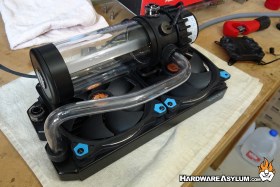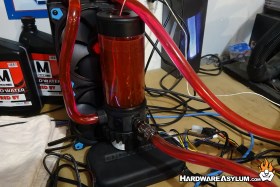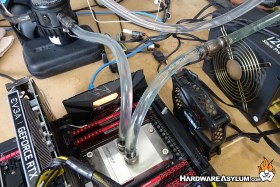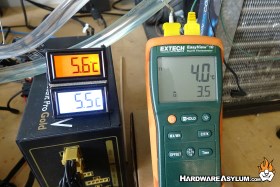Modwater PC Watercooling Coolant Performance Review
Author: Dennis GarciaPerformance Testing
TRX40 Aorus Master – TRX40 Chipset
AMD Ryzen Threadripper 3960X (3.8Ghz) 24 Core 24 x 512KB L2 Cache 8x 16MB L3 Cache
Watercool Heatkiller IV Waterblock
XSPC D5 Photon 170 Pump Res Combo w/ D5 Pump
Alphacool 280 Radiator
2x Thermaltake Rinng 280mm fans
Custom Single Stage Phase Chiller
Combination of 7/16” Tygon Tubing / PETG Hardline
Total System Capacity 800Ml
2x Inline Thermal Probes
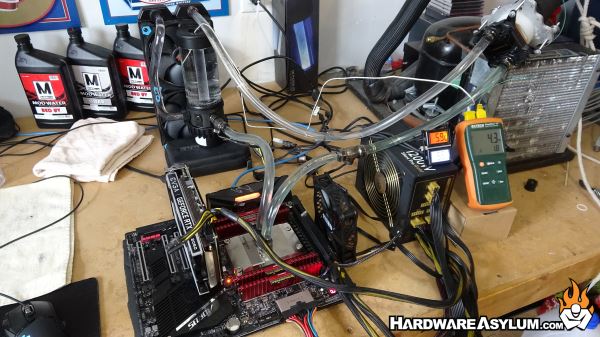
The purpose of this performance test is mostly educational backed by some science. Most will tell you that cooling performance is determined by the types of blocks you are running, or the size of your radiator or even the type of fans you are using. All of these factor into the equation and yet many ignore the part of a loop that actually makes it all work, the coolant.
Generally speaking the temperature changes inside a PC loop are very small and are why most YouTube channels will tell you that performance is determined by the entire system. It is easy to quantify when looking at it from this perspective and does a good job at getting people to argue in the comments section.
The test I devised is a real world test of thermal capacity or a look into how much heat the coolant can absorb when heated and cooled. There are a three major factors involved in this test including:
- Mass of the material, in this case fluid
- Specific Heat of a material,
- Temperature difference before and after
To put it simply consider this. When you boil water a pot with less water will boil faster than one in with more water. This is a change in mass given that everything else is equal and why most will say having a larger reservoir gives you more heat capacity.
What I am testing is the Specific Heat of these fluids which is important because it will determine how “fast” your water loop heats to a certain temperature. This will impact the fluid temperature and the demands on your liquid to air intercooler. (eg Radiator)
Fluid capacity of the loop: 800ml
Temperature Delta: 5c to 35c
Results will be the time it takes for the fluid entering the CPU block to rise 30 degrees
Higher numbers are better
The loop is pretty straight forward. Fluid starts at the pump and will go directly into the radiator. From there it moves to a waterblock connected to my Single Stage Phase chiller and is how I will reduce the fluid temperature down to 5c. From the chiller the fluid moves to the Heatkiller IV cooling a Ryzen 3960X Threadripper before going back to the pump.
Tubing used is a combination of Tygon and PETG with the reservoir being glass.
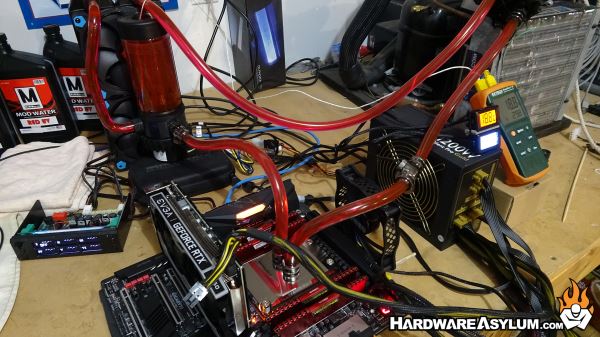
Temperature sensors are located at the T fittings before and after the CPU block and as a safety measure I am monitoring reservoir temps and the phase head using the EXTech Thermocouple.
Much like with my heatsink tests I’m using Prime 95 set to Small FFTs and running the test just long enough for the loop to reach the target temperatures. A stopwatch will record the elapsed time and the test was repeated three times with the average being shown below.
Editor Note: Primochill True Red wasn’t tested because I was lazy and didn’t want to spend the time cleaning the loop afterwards. Besides this is a review of Modwater against two popular control tests.
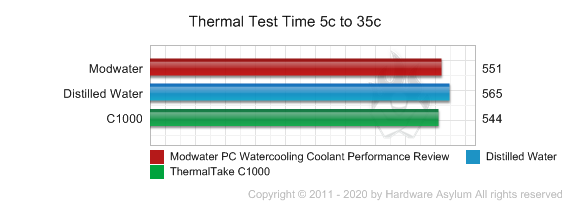
What you are seeing here is how the specific heat of each coolant has been changed based on what has been added to the fluid. The general rule and, WHY nobody considers the performance of a coolant, is because most coolants are water based and pure water has the highest heat capacity of any fluid.
Changes to the coolant reduce the capacity. They may expand the operating temperature range but in terms of capacity pure water is king.
As expected Distilled water offers the best performance. Modwater from ModMyMods comes in a very close second followed by the C1000 from Thermaltake.

